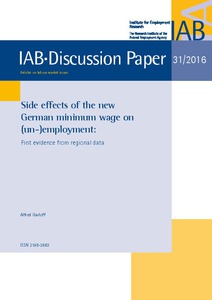Side effects of the new German minimum wage on (un-)employment - First evidence from regional data
"In Germany, decreasing collective bargaining coverage and rising wage inequality led to the introduction of a new statutory minimum wage of EURO 8.50 per hour of work. We analyze the relationship between the bite of the minimum wage and employment/ unemployment growth using regional data of th...
| Main Author: | |
|---|---|
| Institution: | ETUI-European Trade Union Institute |
| Format: | TEXT |
| Language: | English |
| Published: |
Nürnberg
2016
IAB |
| Subjects: | |
| Online Access: | https://www.labourline.org/KENTIKA-031712485999-Side-effects-of-the-new-German.htm |
| Summary: | "In Germany, decreasing collective bargaining coverage and rising wage inequality led to the introduction of a new statutory minimum wage of EURO 8.50 per hour of work. We analyze the relationship between the bite of the minimum wage and employment/ unemployment growth using regional data of the Federal Employment Agency for prime age individuals. We use difference-in-differences type of specifications using a panel of region-age-sex cells. The results do not provide evidence in favor of a reduced employment growth for the analysed groups, nor do they provide evidence for an increase in unemployment growth due to the minimum wage. However, we find an increase in growth of regular employment at the expense of marginal employment." |
|---|---|
| Physical Description: | 30 p. Digital |

